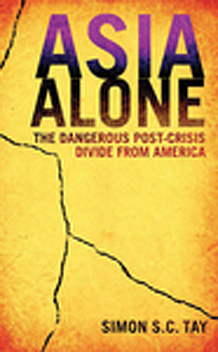Asia Alone
More on:

This is the title of a thought-provoking new book by Singaporean writer and political analyst Simon Tay. I had read a draft of the book several months back and been so impressed that I offered a blurb for the back of the book. Now that it is out, I hope that a lot of people will read it. It is one of the best new books on Asia out there.
What makes it so good? Two things, I think.
First, Tay’s argument is novel and compelling. Asia, defined primarily as the states of ASEAN, is not simply a playground or pawn for a game between the United States and China. It is a regional power unto itself, and Tay argues that neither the United States nor China ought to take the region for granted—both must work to engage the region in new ways. Tay pushes for the United States to recognize ASEAN as a full partner; American leadership and even “mentorship” will continue, but it must be exercised in a new, more multilateral approach. Similarly, in Tay’s vision of the future, with ASEAN as a hub, China is a spoke, along with Japan and South Korea. While Tay is not interested in Asian countries banding together against a rising China, he also has no interest in a revival of the tributary system. Tay sees no reason for Asia to welcome China as "the new regional leader".
Second, Tay is an informed and nuanced writer. Singaporean born and bred, Tay writes about the United States from a deep well of experience; he has spent a lot of time here as a student, teacher, and visiting scholar. He has a unique outsider/insider perspective on both the United States and Asia that few can replicate. He thus avoids the trap of many Asia hands (both those in Asia and those in the United States) who tend to see China (and the United States) as either a perpetrator of good or evil, with not much in between. Tay’s Singaporean compatriot Ambassador Kishore Mahbubani, for example, travels the world as a defacto emissary for China. In his view, the United States is a largely malign power whose time has passed. You have to dig deep, on the other hand, to find much positive in Australian analyst John Lee’s writings on China. For him, China, whether on the home front or abroad, means trouble.
There is perhaps a third reason to pick up Tay’s book—it is just superlatively written. In addition to his full-time work in the political world, Tay writes novels, and it shows. The book is full of lively descriptions, anecdotes, and interviews. Pick it up for the plane or the train…or even the beach. You won’t be disappointed.
More on:
 Online Store
Online Store
